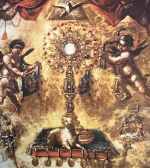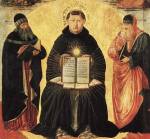THE MAGNIFICAT

THE FIVE FIRST SATURDAYS IS A DEVOTION NEEDED NOW MORE THAN EVER! FIND OUT MORE HERE
THE SAINT MICHAEL PRAYER AND THE ROSARY
ARE ALSO POWERFUL PRAYERS TO HELP US THROUGH THESE VERY TURBULENT TIMES!
FATHER CHAD RIPPERGER HAS RELEASED A PRAYER CONSECRATING THE 2024 ELECTION TO THE BLESSED VIRGIN MARY!
DETAILS (AND THE PRAYER ITSELF) HERE
READ ABOUT (AND JOIN IN PRAYING!)
CARDINAL BURKE'S 9 MONTH NOVENA HERE
HIGHLY RECOMMENDED! DELIVERANCE PRAYERS,
A BOOK FROM SENSUS TRADITIONIS PRESS
(A GREAT PUBLISHER HELPING US FIGHT OUR MANY SPIRITUAL BATTLES NOWADAYS)!
THIS WEBPAGE IS ALSO AVAILABLE
AS A PODCAST HERE
The Magnificat, taken from Luke’s Gospel (1:46-55), is the Blessed Virgin Mary’s hymn of praise to the Lord. It is also known as the Canticle of Mary in the Liturgy of the Hours, a special collection of scripture readings, psalms, and hymns that constitute what is known as the prayer of the church. (Priests and other religious are required to pray sections from the Liturgy of the Hours each day.)
Although the Magnificat has had numerous musical settings from such composers as Palestrina, Bach and Mozart, it can be recited as well as sung. Its name comes from the first line of its text in Latin (“Magnificat anima mea Dominum”) translated in the first line below. Mary proclaims the Lord’s greatness with characteristic humility and grace here.
My soul magnifies the Lord
And my spirit rejoices in God my Savior;
Because He has regarded the lowliness of His handmaid;
For behold, henceforth all generations shall call me blessed;
Because He who is mighty has done great things for me,
and holy is His name;
And His mercy is from generation to generation
on those who fear Him.
He has shown might with His arm,
He has scattered the proud in the conceit of their heart.
He has put down the mighty from their thrones,
and has exalted the lowly.
He has filled the hungry with good things,
and the rich He has sent away empty.
He has given help to Israel, his servant, mindful of His mercy
Even as he spoke to our fathers, to Abraham and to his posterity forever.
The Magnificat provides great material for meditation on the Visitation, the second Joyful Mystery of the Rosary, pictured above. When the angel Gabriel informs Mary that she is to be the Mother of God, he also tells her of her relative Elizabeth’s pregnancy with John the Baptist.
After Mary gives her famous consent to becoming the Mother of God, -- “Behold the handmaid of the Lord; be it done to me according to thy word” (Luke 1:38) -- she goes “with haste” (1:39) to help Elizabeth, who is delighted to see her. Our Lady then expresses her joy in the Magnificat.
We can admire Mary’s devotion (as well as her stamina!) in setting out on what must have been an arduous journey to go from Nazareth, where she lived, to a town in Judah where her cousin lived, about 70 miles away.
(Remember, this was in an era when she couldn’t just hop in a car or a bus to get there!)
Clearly Mary, in hastening to help her cousin, is focused on service to others. In this way she glorifies the Lord in reflecting (and “magnifying”) His goodness and love. And, of course by becoming the Mother of God she will help Him redeem us for our salvation in His Passion!
Speaking of magnifying, Archbishop Fulton J. Sheen once referred to our Blessed Mother as being like “a magnifying glass that intensifies our love of her Son.”
Note that Mary’s joyful claim that “all generations shall call me blessed” in no way takes away from her humility. If she seems to boast here, it is much as St. Paul does later on in scripture when he says “whoever boasts, should boast in the Lord” (2 Cor 10:17), that is to say, in God’s work being done through us.
In this regard, the Magnificat is more than a prayer of praise. It also reminds us about the essential link between humility and holiness. Just as God has “regarded the lowliness of his handmaid” and “has done great things” for Mary in making her the Mother of his Son, so too “he has put down the mighty from their thrones (with his own might!) and has exalted the lowly.”
(Note also our Blessed Mother’s humility in referring to herself in this prayer, as she does in giving her consent to Gabriel mentioned earlier, as the Lord’s handmaid, his servant!)
As her Divine Son later stressed “Whoever exalts himself shall be humbled, and whoever humbles himself shall be exalted” (Matt 23:12, also in slightly different words in Luke 18:14 and Luke 14:11).
Jesus wasn’t saying anything new here, either! We read similar thoughts in throughout the Old Testament such as in the Psalms and in this example from the book of Sirach “Humble yourself the more, the greater you are, and you will find favor with God.” (Sirach 3:19)
The line about God filling “the hungry with good things” resonates later in the Gospels as well, when our Lord says “Blessed are they who hunger and thirst after righteousness for they will be filled” (Matt 5:7). This serves as a good reminder for us to “stay hungry” for God’s graces in praying and in reading His word in scripture.
And as for the rich being sent away empty? This line refers to those who live for wealth and power and feel they have everything figured out. These people in, effect wish to be Gods rather than God’s. How can our Lord fill those who are already full--of themselves?
How about you? Does your soul magnify the Lord? We may never be able to approach Him from Mary’s level of sanctity as the Mother of God. Still, we are all called to be saints nonetheless.
Your good example, like our Blessed Mother’s, can help others in their spiritual growth. Do people see Christ’s love and goodness in you? Are you letting God work within you to accomplish His will? Let Mary help give you the graces you need to follow her Son and His Church in praying the Magnificat.
As St. Ambrose once said in referring to this wonderful prayer, "Let Mary's soul be in us to glorify the Lord; let her spirit be in us that we may rejoice in God our Saviour."
FROM OUR BOOK AND GIFT STORE
OR CAFE PRESS STORE!
22
Return from the Magnificat
to Marian Prayers













